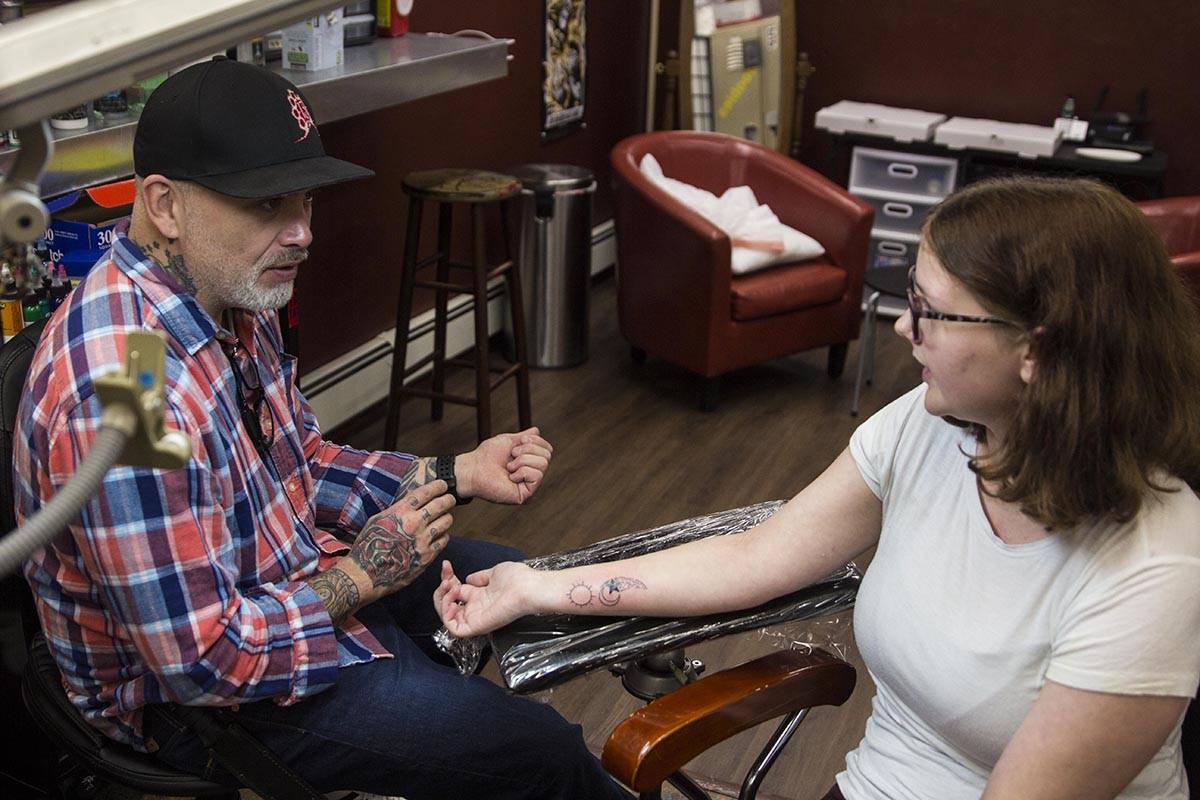International Suicide Survivors Day falls on the Saturday before Thanksgiving every year, and for the second year in a row in Juneau, more than 30 chose to spend that day getting a permanent reminder of their loss and their determination to keep going.
Suicide survivors — anyone who’s had a brush with suicide, either in their life or in the life of a friend or relative — could get discounted tattoos featuring a semicolon at Taku Tattoo.
“It’s about that tattoos but it’s more about putting something on you to tell people about you, something good,” said Mario Singh, owner of Taku Tattoo and host of the event.
The idea behind semicolon tattoos grew out of an awareness campaign started by Amy Bleuel, said Jan Reece, the training and outreach coordinator for the Juneau Suicide Prevention Coalition. The idea is that authors use semicolons to continue a sentence, instead of ending it. In the same sense, suicide survivors choose to live on, rather than ending their story. Bleuel died by suicide in 2017.
“Jan got a hold of us last year, and she kind of threw it by us,” Singh said. “I thought it might be a little dark, but everyone had a good time.”
[Survivors, moms and first-timers get tattoos for suicide prevention]
The punctuation mark was worked into many forms, which included being incorporated into birds and feathers, a moon and sun and part of compass roses. Participants were requested to keep their tattoos down to about the size of a business card to make sure there’d be enough time for everyone, Singh said.
Garrette Reece, Jan Reece’s son, talked about the blue jay feather he intended to get on his forearm in memory of a friend, incorporating the semicolon into the plumage.
“I like that the feather isn’t clean, it’s been ruffled,” Garrette Reece said. “It’s simple, but it has a lot of meaning.”
Birds were a popular choice. Another participant, Sam Mason, was tattooed with a robin to commemorate when he chose to come out to his mother.
“If she hadn’t accepted me, I might have gone to a deep dark place,” Mason said.
The week included other suicide prevention-related events, including an awareness night at Treadwell Arena for a high school hockey game and a screening of “The Ripple Effect,” a movie by Kevin Hines, a suicide survivor who survived an attempt to end his own life by jumping off the Golden Gate Bridge.
“Last year we did a movie that talked about survivors, ‘The S Word,’” said Jan Reece, “It was to break the stigma, to get people talking about mental health, mental wellness.”
In Juneau, the JSPC is spearheading suicide prevention. Partnered with organizations like the University of Alaska Southeast, the Juneau Alliance for Mental Health Inc., and the National Alliance on Mental Illness, JSPC is 10 years old this year, Reece said. Increased awareness and improved best practices have increased engagement and numbers of people helped during that time, Reece said.
“I think for years that people didn’t understand mental health issues,” Reece said. “I think there’s greater diagnoses, more community support, more recognition, more education.”
If you’re worried someone is contemplating suicide
Reece said that the method for helping someone who may be contemplating suicide has three parts: Question, Persuade, Refer.
Question– are you feeling suicidal? Studies have shown that asking someone directly isn’t going to push them into acting like the fear used to be. Ask them straight out.
Persuade– You should get help. Persuade them, don’t force them.
Refer– Refer to professional help. The JSPC site has a large number of resources someone seeking assistance can reach out to.
The JSPC site also has a number of emergency resources available, with explanations of what they’ll do and how they’ll help someone.
The National Suicide Hotline is 1-800-273-8255, and has options for non-English speakers or the hearing impaired.
• Contact reporter Michael S. Lockett at 757-621-1197 or mlockett@juneauempire.com.

